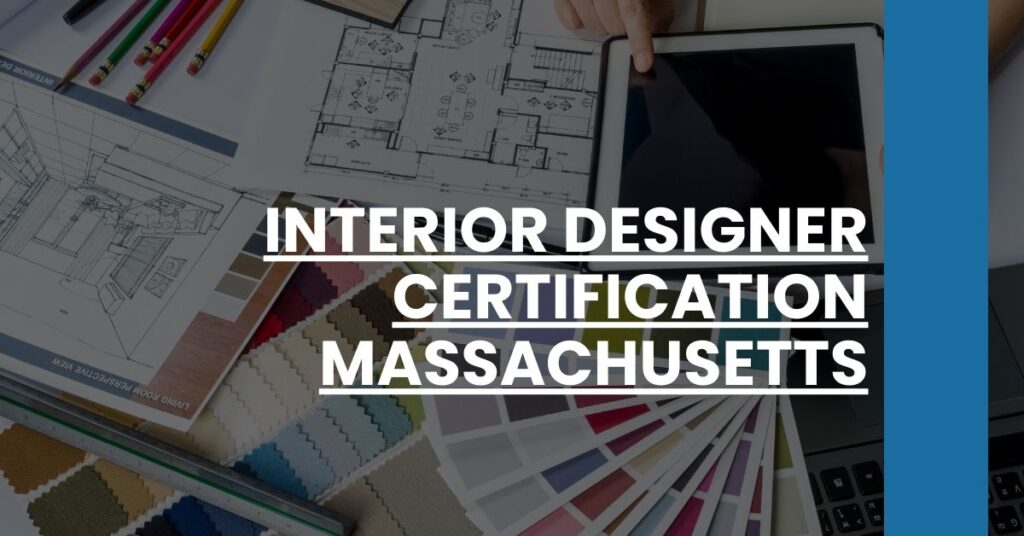Looking for programs in a specific city? Check out our lists of Interior Design Programs in Boston, Worcester, Springfield, Cambridge, Lowell, Brockton, Quincy, Lynn, and New Bedford
Navigating the path to “Interior Designer Certification Massachusetts” can feel overwhelming, especially with the various requirements and options available. I understand that standing out in the competitive Massachusetts market can seem daunting.
Fortunately, becoming certified can greatly enhance your career opportunities and credibility. To make this process easier, our team has put together a comprehensive guide to help you:
- Understand the significance and benefits of Interior Designer Certification in Massachusetts
- Learn about the educational prerequisites and top accredited programs in Massachusetts
- Get detailed information on certification exams and additional requirements
This guide aims to provide clarity and direction as you pursue your certification and advance in your interior design career.
- What Is Interior Designer Certification?
- Why Get Certified as an Interior Designer in Massachusetts?
- Educational Requirements for Interior Design Certification
- Certification Exams and Requirements
- Accredited Interior Design Programs in Massachusetts
- Internships and Work Experience
- Continuing Education for Interior Designers
- Common Challenges and How to Overcome Them
- Career Opportunities for Certified Interior Designers in Massachusetts
- Resources and Professional Associations
- Looking for Interior Designer Information On States Bordering Massachusetts?
- Conclusion
What Is Interior Designer Certification?
What Does It Mean to Be a Certified Interior Designer?
Becoming a certified interior designer means you have met specific professional standards required by the industry. As defined by the American Society of Interior Designers (ASID), this credential signifies your competence and adherence to high industry standards.
Importance of Certification
With certification, you:
- Stand Out Professionally: Certification differentiates you from amateurs. It signals your expertise and commitment to quality, alluring clients who seek your skill set.
- Access Better Opportunities: Many firms and clients prefer working with certified designers because they trust that certification processes vet for professionalism and quality.
- Ensure Compliance: Certification ensures you adhere to local laws and regulations, making your practice both legal and respected.
Why Get Certified as an Interior Designer in Massachusetts?
Benefits of Certification Specific to Massachusetts
Massachusetts offers unique advantages for certified interior designers.
- Increased Job Prospects: Massachusetts’ legislation allows certified commercial interior designers more independence, broadening your career possibilities.
- Enhanced Credibility: Certification amplifies your professional credibility, crucial in a competitive market like Massachusetts.
- Independence in Practice: You can independently obtain building permits, offering clients a streamlined service experience.
Legal and Professional Recognition
Legislation passed by the Massachusetts Senate establishes a licensure process for commercial interior designers. With these credentials, you gain significant leverage in the field, enhancing your professional footing.
Educational Requirements for Interior Design Certification
Accredited Programs in Massachusetts
To achieve certification, you need a degree from an accredited institution. Massachusetts boasts several reputable schools:
- New England School of Art and Design at Suffolk University: Offers a BFA in Interior Design and an MA in Interior Architecture & Design. Both programs are accredited by the Council for Interior Design Accreditation (CIDA).
- Wentworth Institute of Technology: Known for its CIDA-accredited Bachelor of Science in Interior Design.
Coursework and Skills Development
These programs offer coursework designed to equip you with fundamental and advanced skills, including:
- Design Principles: Master basic and complex design concepts.
- Space Planning: Learn to optimize space for functionality and aesthetics.
- Computer-Aided Design (CAD): Gain proficiency in industry-standard digital tools.
- Construction and Building Codes: Understand the legal and structural aspects of interior design.
Online Educational Options
For those looking to study remotely, consider online interior design degree programs that offer flexibility without sacrificing quality.
Certification Exams and Requirements
NCIDQ Exam: The Gold Standard
To become certified in Massachusetts, you need to pass the National Council for Interior Design Qualification (NCIDQ) exam. This exam tests your:
- Knowledge of Core Design Concepts: Assess your understanding of design principles.
- Application of Building Codes and Standards: Ensure you can create functional and compliant spaces.
- Practical Skills in Interior Design: Evaluate your ability to apply what you’ve learned in real-world scenarios.
Steps to Qualify for the NCIDQ
Before you can sit for the NCIDQ exam, you must:
- Complete Accredited Education: Hold a degree from a CIDA-accredited program.
- Accumulate Work Experience: Gain significant supervised work experience in interior design. Typically, this includes thousands of hours working under a licensed professional.
Useful Resources
Prepare for the exam using NCIDQ practice exams. These resources can offer a critical edge in passing the certification.
Accredited Interior Design Programs in Massachusetts
Highlighting Top Institutions
Several Massachusetts institutions offer top-notch, accredited programs:
- New England School of Art and Design at Suffolk University: Renowned for its BFA and MA programs in Interior Architecture & Design, both CIDA accredited.
- Wentworth Institute of Technology: Offers a CIDA-accredited Bachelor of Science in Interior Design.
These programs stand out for their comprehensive curricula, experienced faculty, and strong industry connections.
Choosing the Right Program
When selecting a program, consider factors like:
- Accreditation: Ensure the program is CIDA accredited.
- Faculty Expertise: Look for programs with experienced, industry-savvy instructors.
- Career Services: Choose a school that offers robust career support to help you find internships and job placements.
Discover more about interior design programs and the best interior design schools through these links.
Internships and Work Experience
The Role of Internships
Internships are fundamental for gaining hands-on experience. They:
- Bridge Theory and Practice: Allow you to apply classroom knowledge in real-world settings.
- Build Professional Relationships: Help you network within the industry, fostering connections that can lead to job opportunities.
- Enhance Your Portfolio: Provide you with projects and experiences to showcase your skills to potential employers.
Requirements for Certification
To qualify for certification and the NCIDQ exam, you need substantial work experience:
- Supervised Experience: Complete thousands of hours under the supervision of a licensed interior designer.
- Hands-On Projects: Engage in a variety of project types to broaden your expertise.
Massachusetts institutions like Suffolk University strongly encourage hands-on learning. This kind of experience is invaluable as you prepare for certification and your professional career.
Continuing Education for Interior Designers
Interior design is a dynamic field, requiring ongoing education to stay updated with industry trends and standards.
Importance of Continuing Education
Continuing education is crucial for maintaining your certification and ensuring you remain competitive in the market. It allows you to:
- Stay Current: Keep up with the latest design trends and technologies.
- Enhance Skills: Deepen your expertise in specialized areas.
- Fulfill Certification Requirements: Many certification bodies, including NCIDQ, require periodic education credits to renew certifications.
In Massachusetts, continuing education ensures that you are knowledgeable about state regulations and best practices. This not only boosts your professional standing but also instills confidence in your clients.
Opportunities for Professional Development
Numerous opportunities exist for continuing education in Massachusetts. These range from workshops and seminars to online courses and industry conferences. Here are some resources you can explore:
- American Society of Interior Designers (ASID): Offers a variety of webinars and in-person events tailored to interior designers.
- International Interior Design Association (IIDA): Provides workshops and conferences that count toward continuing education credits.
- Local Universities and Colleges: Institutions like the New England School of Art and Design frequently offer professional development courses.
Staying engaged with these resources not only helps in maintaining your certification but also keeps you connected with the professional community.
Common Challenges and How to Overcome Them
Meeting Rigorous Educational and Experiential Requirements
Interior design certification involves stringent educational and experiential prerequisites that can be challenging. Here’s how you can meet these:
- Plan Early: Start gathering experience and education as soon as you decide to pursue interior design.
- Seek Internships: Gain as much hands-on experience as possible. Internships provide vital industry exposure.
- Balance Work and Study: Create a time management strategy to balance your workload and academic requirements effectively.
Financial Costs of Certification
The costs associated with obtaining certification can be substantial. These include tuition fees, exam costs, and other miscellaneous expenses. To ease the financial burden:
- Apply for Scholarships: Many institutions offer scholarships specifically for interior design students.
- Seek Employer Sponsorship: Some employers may fund your certification process if they see value in your advanced credentials.
- Budget Wisely: Plan your finances in advance to cover the costs progressively.
Maintaining Certification
Continuing education and certification renewals require ongoing effort. To maintain your certification:
- Keep Track of Deadlines: Make sure you are aware of renewal deadlines and requirements.
- Stay Engaged with Professional Associations: Organizations like ASID and IIDA can remind you of upcoming renewal needs and provide resources for continued learning.
- Document Learning Activities: Keep a detailed record of your continuing education activities as proof for renewal applications.
Career Opportunities for Certified Interior Designers in Massachusetts
Job Market Landscape
Massachusetts has a thriving job market for certified interior designers. The state’s recent legislative support and the presence of prestigious institutions foster a fertile ground for career growth.
Types of Career Opportunities
Certified interior designers in Massachusetts can venture into various sectors:
- Residential Design: Focus on creating functional, beautiful living spaces.
- Commercial Design: Specialize in office spaces, retail environments, and hospitality sectors.
- Institutional Design: Work on projects like schools, hospitals, and government buildings.
Employment Settings
- Interior Design Firms: Join established firms like Boston-based Elkus Manfredi Architects.
- Corporations: Many large companies hire in-house interior designers to manage their corporate spaces.
- Freelance: Operate independently, offering consultancy services to a range of clients.
Graduates from accredited programs such as those at Suffolk University and Wentworth Institute of Technology are often highly sought after, thanks to their rigorous training and strong industry connections.
Job Prospects and Salaries
According to the U.S. Bureau of Labor Statistics, the median annual wage for interior designers in Massachusetts is significantly higher than the national average. This reflects the state’s robust demand and value for certified professionals.
Resources and Professional Associations
Key Resources
Utilizing the right resources and being a part of professional associations can greatly benefit your career.
- American Society of Interior Designers (ASID): This association offers professional development, networking opportunities, and resources for continued education.
- International Interior Design Association (IIDA): Provides educational events, industry insights, and a supportive community for interior designers.
- Council for Interior Design Qualification (CIDQ): Offers information and resources for those preparing for the NCIDQ exam and maintaining certification.
Networking and Professional Growth
Engagement with these associations provides numerous benefits:
- Networking Opportunities: Meet and connect with other interior design professionals.
- Educational Resources: Access to webinars, workshops, and courses that aid in continuing education.
- Advocacy and Support: Receive advocacy for industry standards and professional practices at both local and national levels.
Being active in these organizations not only enhances your knowledge and skills but also helps you stay connected with the latest industry trends and opportunities.
Looking for Interior Designer Information On States Bordering Massachusetts?
In addition to Massachusetts, we suggest looking for programs in nearby states.
- Interior Designer Certification Connecticut
- Interior Designer Certification Rhode Island
- Interior Designer Certification New York
- Interior Designer Certification New Hampshire
- Interior Designer Certification Vermont
Conclusion
Pursuing interior designer certification in Massachusetts is a rewarding endeavor that opens up numerous professional opportunities. Understanding the educational and experiential requirements, staying updated with continuing education, and engaging with professional resources can significantly propel your career forward. Taking these steps will not only fulfill your certification needs but also ensure you thrive in the vibrant and competitive Massachusetts interior design market.

